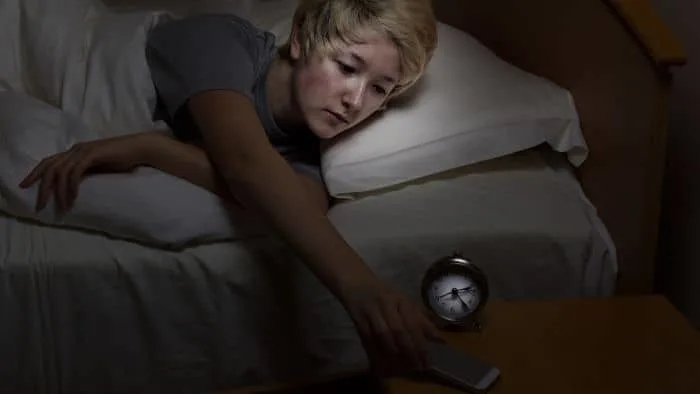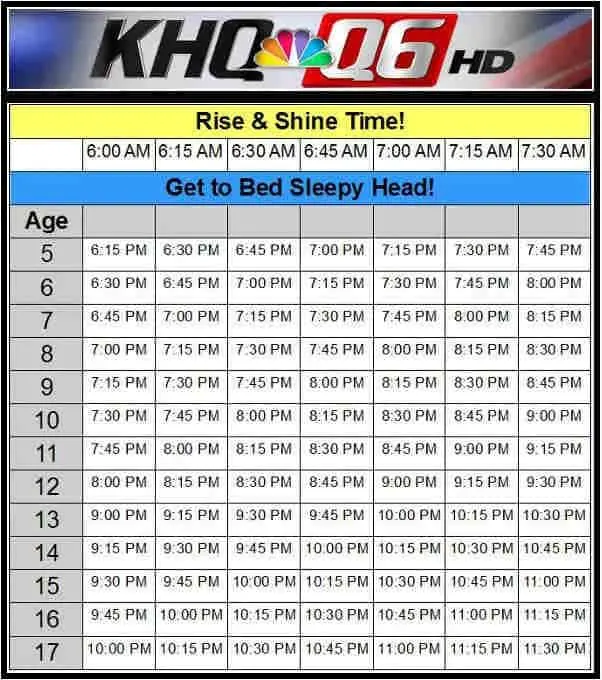Curfews include times that teens should go to bed, get off their devices, what times they can drive on their own, and at what time they need to be home. These curfews for teenagers might seem like a lot of rules, but they are mainly set in place to keep them safe and ensure they get an adequate amount of sleep.
Teenagers might argue against curfews, but they should know what the legal curfew is in their state and should negotiate and accept a reasonable bedtime, screentime, and home time curfew with their parents.
Let’s look more in-depth into these different curfews and how to set a curfew for your teenager.
- What Is A Curfew?
- Legal Curfews For Teens
- Why Should Teens Have A Curfew?
- How To Set A Curfew For Your Teenager?
- What Is A Reasonable Time For A Teen Curfew?
- Punishment or Consequences For Breaking Curfew
- Does Curfew Keep Teens Out Of Trouble?
- Curfews Can Help Them Get Out Of A Bad Situation
- What Is A Digital Curfew?
- What Is The Driving Curfew For Teens?
What Is A Curfew?
A curfew is a set rule for when you need to be home at night. Curfews can be legal orders imposed by the State you live in, or parents can set them for when they want their children to be home.
Although we’ve recently had worldwide curfews implemented due to the pandemic, in this blog post, we’ll be talking about local ordinances and parental curfews for teenagers.
Legal Curfews For Teens
Local ordinances and state statutes may make it unlawful for minors below a certain age to be on public streets, unless they are accompanied by a parent or an adult or on lawful and necessary business on behalf of their parents or guardians. For example, a Michigan state law provides that “[n]o minor under the age of 12 years shall loiter, idle or congregate in or on any public street, highway, alley or park between the hours of 10 o’clock p.m. and 6 o’clock a.m., unless the minor is accompanied by a parent or guardian. Curfew laws in other states and cities typically set forth different curfews for minors of different ages.” – Wikipedia
Local ordinances and city laws are sometimes called ‘muncipal code’ or ‘city code’. You can find curfew laws for your city at your local police department. You can also search by state, county, and city on the National Youth Rights Association website.
It’s important for both parents and teens to know the local curfew law for your area, as you might be okay with allowing your 17-year-old to stay out to midnight on a Saturday night; however, if you live in the State of California, your teen might not be allowed to be in a public space (without being accompanied by a parent or guardian) after 10 pm. Check to see your local curfew laws here.
If you violate a state curfew law and are outside in a public place after the set time, there could be legal consequences:
- you may be ticketed
- you may have to pay a fine or do community service
- you might be held at a police station until a parent or guardian can fetch you
- your parents might be cited for your violation of curfew laws
According to Law For Kids, you can be out past curfew only if you:
- Are with your parent or guardian
- Are with an adult and have prior permission from your parent or guardian
- You are traveling to another state in a motor vehicle and have permission from your parent or guardian
- You are going or returning from work by the most direct route without any detours or stops
- You are involved in an emergency or have prior permission from your parent or guardian and are engaged in a reasonable, legitimate, and specific business and/or activity
- You have prior permission from your parent or guardian and are engaged in a reasonable exercise of your First Amendment Rights protected by the United States Constitution
- You are married and 16 years of age or over, or in the military, are on the sidewalk in front of your house or on the next-door neighbor’s property with their consent. – Law For Kids
Why Should Teens Have A Curfew?

Parents set curfews for their teenage children to help make sure their teen is safe.
As teens get older, they will want to be more independent and will see how far they can push the boundaries. This is part of being a teen and learning how to grow up.
The parent’s job is to ensure their safety while allowing them to try new things. By setting clear boundaries, like curfews, teens can be given more freedom to be independent whilst playing within the rules.
The later teens are out, the more chance they have of spending time with older teens or young adults. Curfews, therefore, lessen the possibility of teens being exposed to inappropriate behavior.
It is also safer to drive home before midnight, as there may be drunk drivers out on the road once the bars and nightclubs close.
Having a curfew also teaches them responsibility, self-control, and time management skills. It’s better to learn how to be a responsible adult and make small mistakes where the main consequence might be losing phone privileges. Once you’re an adult and you haven’t learned to follow the rules or how to manage your time, the consequences can be much harsher.
Lastly, all parents worry about their children (and spouses) and want to make sure that they’re safely home and tucked up in bed at night. I don’t sleep well until everyone is home, so it’s also important for my own sanity and so that I can get a good night’s sleep.
How To Set A Curfew For Your Teenager?

Your teen will most likely not be keen on a curfew at first and might moan and complain that his friends don’t have curfews.
Let them complain, but ultimately it’s your job to help them become responsible adults, and understanding why coming home at a reasonable hour is part of that process.
A curfew is best set in collaboration with your teenager so that they understand that it’s for their own safety and your peace of mind.
You can talk to other parents, especially their friend’s parents, and discuss what you all think would be a fair curfew.
Tips For Setting A Curfew For Your Teen:
-
- Explain that the goal of a curfew is to ensure that your teenager gets home safe at a reasonable hour.
- Curfew must be reasonable and rational.
- Curfews work best if discussed and agreed upon by your teen. Discuss with your teen what they feel is a reasonable curfew and negotiate if necessary from there.
- Remember that every teen is different, has different extramural activities, and might need to have a different curfew.
- Make sure that they understand your expectations. For example, they need to be home no later than the set curfew, and they need to call before their curfew is up to let you if they’re going to be late. Also, discuss possible reasons that are acceptable for being late and which are not.
- Reassess curfews as your teens get older and if their activities outside of the home change.
- Consider a different curfew for school nights versus weekends, holidays, and special events.
- Ensure you adhere to local curfew laws in your State. Many states have set a curfew for minors from 11 pm to 5 am from Sunday to Thursday.
- Ensure that your teen gets enough sleep and adjust their curfew accordingly. Teens aged 13 to 18 years need 8-10 hours of sleep per night. This is especially important during the week and school terms. Just as you set a bedtime curfew, you should instill a home-time curfew with your teens as well.
- Make sure your teenager understands the rules and consequences of being late.
- Give your teen a way to get in touch with you if they’re running late or need you to come and fetch them for whatever reason.
- Last but not least, staying awake until your teen walks in the door will be very effective. Teenagers who are aware that their parents are waiting up for them will be more likely to be on time.
- If you can’t or don’t want to stay up until they get home, then get them to wake you up and let you know that they’re home safe. This will allow you to check the time as well as look for signs of possible alcohol or drug use.
What Is A Reasonable Time For A Teen Curfew?
Curfew times will vary for every person and family. The ultimate goal is to make sure your teen comes home safely, gets enough sleep, and that you don’t sit up worrying about them.
Below are some guidelines per age for reasonable bedtimes, curfew times, as well as legal curfews in certain states.
These are not definitive, and you need to establish a curfew that works for you and your child.
You might want to consider where you live as well. If you live in a safe area where most kids are outside playing soccer and all ride their bikes home together afterward, then curfew might be later than if you live in a high-crime neighborhood where kids should be home before dark.
Obviously, once they can drive the rules will again be different.
Establishing a reasonable bedtime for your teen will also depend on what time they will need to get up for school.
Another factor is how easy it is for them to wake up in the morning. No one likes to get up early, but if your teen is seriously struggling to get up every morning, then consider making their bedtime slightly earlier and see if that helps.
Weeknight Bedtimes For Teens
Reasonable Bedtime For 13-Year-Old – 8 – 9 pm
Reasonable Bedtime For 14-Year-Old – 9 pm
Reasonable Bedtime For 15-Year-Old – 9 – 10 pm
Reasonable Bedtime For 16-Year-Old – 10 pm
Reasonable Bedtime For 17-Year-Old – 10 – 11 pm
Reasonable Bedtime For 18-Year-Old – 11 pm
Here’s a great chart showing what time your teen should go to bed depending on what time they have to get up in the morning.
In general, it’s probably a good idea to get your teen home an hour before bedtime. This ensures their safety, as well as having some time to decompress before going to sleep.
As they get older and have proven that they can be home on time and be trusted, and they don’t have a problem getting up in the morning, then you could discuss pushing out their curfew.
Weeknight Curfews For Teens
Reasonable Weeknight Curfew For 13 Year Old – 8 pm
Reasonable Weeknight Curfew For 14 Year Old – 8 pm
Reasonable Weeknight Curfew For 15 Year Old – 9 pm
Reasonable Weeknight Curfew For 16 Year Old – 9 pm
Reasonable Weeknight Curfew For 17-Year-Old – 10 pm
Reasonable Weeknight Curfew For 18-Year-Old – 10 pm
Reasonable Weekend Curfew For Teenagers
On weekends their bedtimes and therefore these curfews can be pushed out by a couple of hours for older teens, especially if they’re attending a party or event.
As they can sleep in on weekends, it’s more important to know where they are and with whom and set a reasonable curfew so that you ensure their safety. Check your state law first though as they might have an earlier curfew than these suggested curfews listed below. If you allow your minor to be out after state curfew times, they will have to be accompanied by yourself or a guardian.
Reasonable Weekend Curfew For 13 Year Old – 8 pm
Reasonable Weekend Curfew For 14-Year-Old – 8 – 9 pm
Reasonable Weekend Curfew For 15-Year-Old – 10 pm
Reasonable Weekend Curfew For 16-Year-Old – 10 – 11 pm
Reasonable Weekend Curfew For 17-Year-Old – 11 pm
Reasonable Weekend Curfew For 18-Year-Old – 11 – 12 pm
Punishment or Consequences For Breaking Curfew

Just as there are consequences for breaking legal curfews, there should be personal consequences for breaking curfew as well.
Speak to them about why curfew is important. It’s best to lead with the most crucial point by explaining that it is for their safety and your peace of mind.
If they are late, you might want to give them another opportunity to prove themselves first before taking away a privilege.
They need to understand that these are privileges, and if they cannot handle this new freedom, then these privileges can be taken away.
It’s probably best to discuss the consequences the following day when you’ve had some rest and time to calm down and be less emotional.
Let them talk first so that they can tell you the whole story. You might need to check up on some facts and then you can calmly discuss and respond accordingly.
Consequences could include bringing their curfew forward or limiting their outings.
Depending on how late they are, punishment shouldn’t be too harsh. For example, if they were 20 minutes late but had a reasonable excuse, then perhaps a discussion and firm agreement on future curfew times and consequences are fair. It’s important to be understanding and flexible.
However, if they didn’t come home until 2 am with no remorse, then a firmer reaction is probably called for.
The ultimate goal is not to punish them or take away their fun but to help them establish guidelines that ensure their safety, show respect for their family, and that they get enough sleep.
They’re going to be out in the real world very soon, and if they’re not living at home, no one will be waiting up for them. Teaching them how to look after their own well-being while they’re still living with you is an essential job for parents.
Give them the freedom to make some mistakes and discuss these with them so that they understand what the consequences are going forward.
Does Curfew Keep Teens Out Of Trouble?
As kids get older they have a need for more independence. They will push the boundaries by testing limits and experimenting. As much as teens will argue, they do need their parents to set clear boundaries for them, to keep them safe. Curfews are therefore vitally important.
Curfews not only lessen the possibility of inappropriate or dangerous behavior, but it also teaches them how to be responsible, manage their time, and show respect to their family and their rules
It might also help them get out of a tricky situation if they find themselves around other teens or older teens doing things they’re not comfortable with. Having a curfew gives them a reasonable explanation as to why they need to leave. Explaining that they would be grounded, or that their car would be taken away for a couple of weeks if they’re late will most likely be an acceptable reason for other teens as to why they need to leave.
The later your teens are out, the more likely they might hang out with older teens and young adults, who might be allowed (legally or otherwise) to do things that your child is not.
As the lyrics in Ed Sheeran’s song ‘Bad Habits’ attest to, late nights usually lead to nothing good.
My bad habits lead to late nights endin’ alone
Conversations with a stranger I barely know
Swearin’ this will be the last, but it probably won’t
I got nothin’ left to lose, or use, or do
My bad habits lead to wide eyes stare into space
And I know I lose control of the things that I say
Yeah, I was lookin’ for a way out, now I can’t escape
Nothin’ happens aftеr two, it’s true, it’s true
My bad habits lead to you” Ed Sheeran lyrics on Genius
Curfews Can Help Them Get Out Of A Bad Situation
Discuss upfront that your teen can message you a specific message which will alert you to the fact that they need you to come and fetch them immediately. For example, they can simply message ‘X’, and then you will call them and tell them that something has happened and you need to fetch them.
This allows your teenager to leave without being ridiculed for wanting to leave. Peer pressure is real, so if they’re given a way out of a bad situation, hopefully, they’ll be more likely to take it.
What Is A Digital Curfew?
A digital curfew is when all technology needs to be switched off for the night. If your teen is able to manage on their own, then it’s an excellent way for them to show maturity by adhering to the rules. However, it might be necessary for most households to keep all devices out of reach and in a different room (i.e., in the office or kitchen) overnight to avoid temptation.
We have a ‘charging station’ in the kitchen where all devices are left to charge overnight.
Megan Moreno, MD, an adolescent health expert at UW Health at the University of Wisconsin-Madison, recommends turning off devices at least an hour before bedtime.
We let our children read (usually in bed) until bedtime, but screens are no longer allowed one hour before bedtime.
What Is The Driving Curfew For Teens?
According to Ruane Attorney’s teenagers under the age of 18 are not allowed to drive between 11 pm and 5 am.
This curfew is put in place to protect teenagers, as most fatal accidents take place late at night or in the early hours of the morning.
Most states have some kind of graduated driver’s license where a young new driver has certain restrictions during the first 6 to 12 months behind the wheel. These restrictions differ from one state to another and include what times they can drive and who they can lift in their car.
There are some exceptions to this curfew rule though:
-
-
- Teenagers are allowed to drive during curfew if they are driving home from work, a religious activity, a school activity, or for a medical necessity.
- They are not allowed to make any stops along the way and need to go straight home.
- They will need some kind of signed documentation from work or the school if you’re driving after curfew.
- They can also drive during curfew if they are accompanied by a licensed driver who is at least 25 years old.
-
If your teenage driver violates either of these restrictions, as a first-time offender they face a 30-day suspension of their driver’s license by the DMV, mandatory payment of $175 license restoration fee to the DMV, and court charges which will likely involve additional fines, fees, and costs. For a second offense, the license suspension period is extended to six months, and the court charges will have greater penalties.” Ruane Attorneys
I hope that this article has shed some light on curfews for teenagers and how to negotiate these with them. Our job as parents is not only to keep our children safe but to teach them how to look after themselves and become responsible adults.

